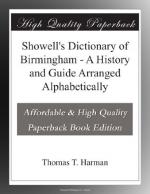Hollins, George—The first appointed organist of the Town Hall (in 1834), having been previously organist at St. Paul’s, in the graveyard of which church he was buried in 1841, the funeral being attended by hundreds of friends, musicians, and singers of the town and neighbourhood.
Holt, Thomas Littleton.—A Press man, whose death (Sept. 14, 1879) at the age of 85, severed one of the very few remaining links connecting the journalism of the past with the present. It was to him that the late Mr. Dickens owed his introduction to Dr. Black, then the editor of the Morning Chronicle. Mr. Holt was proprietor of the Iron Times, which started during the railway mania. When his friend Leigh Hunt was imprisoned for libelling the Prince Regent, he was the first to visit him. He took an active part in popularising cheap literature, and it was greatly owing to him that the advertisement duty was repealed. He also took an active part in the abolition of the paper duty. Besides starting many papers in London in the latter period of his life, he returned to his native town, Birmingham, where he started Ryland’s Iron Trade Circular, to the success of which his writings largely contributed.
Humphreys, Henry Noel.—This eminent naturalist and archaeologist’s career closed in June, 1879. A son of the late Mr. James Humphreys, he was born in Birmingham in 1809, and was educated at the Grammar School here. He was the author of many interesting works connected with his zoological and antiquarian researches. Among the most important of the latter class may be specified:—“Illustrations of Froissart’s Chronicles,” “The Parables of our Lord Illustrated,” “The Coins of England,” “Ancient Coins and Medals,” “The Illuminated Books of the Mediaeval Period,” the “Coin Collector’s Manual,” the “Coinage of the British Empire,” “Stories by an Archaeologist,” and especially his magna opera, so to speak, “The Art of Illumination,” and “The History of the Art of Writing from the Hieroglyphic Period down to the introduction of Alphabets.”




